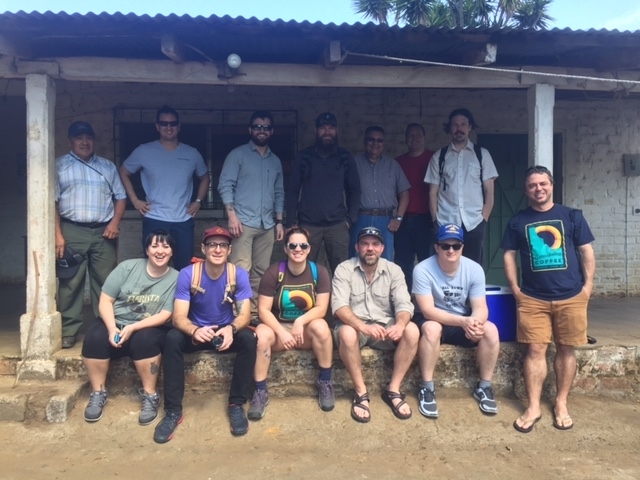Our Group at Finca El Rosario
(The following blog posts are the firsthand perspective of one of our Lead Baristas, Nicole Burrato. We were pleased to bring her to origin for the first time this year, along with Desi Freeman, our wholesale partner with Big Blue Coffee in Coeur D'Alene. Rick Evans)
Four weeks ago, I arrived home from a 3-day trip to beautiful, sunny, delicious coffee-producing El Salvador. On this trip we were hosted by the wonderful Menendez Family, and guided each day by Miguel Sr, Miguel Jr, and Guillermo Menendez throughout their family farms. The thing that strikes me most about this family (immediately after all the delicious coffee we could ever want to try!) was the sense of pride they had in the production of a quality product.
Our group was a rowdy one. With the Evans Crew, Randy and I partnered with Desi from Big Blue in Coeur D' Alene. Dave from Back Porch Coffee in Bend, OR came with a couple of friends and clients. We had two boys, Edwin and Logan, along with their buddy Rick, from Black Rifle Coffee Co., and Christian and Daniel from . Everybody was surprised at the size of the group, and we eyed each other with suspicion and distrust. Not really. Everybody got along quite famously.
On the first day we visited Piedra Grande, the mill that abuts thousands of acres of coffee farms, and through which all of the family's coffee in the area is processed. The drive to the mill takes about 30 minutes from the Menendez Family home in Ahuachapan, and as we bumped our way up the small dirt roads that lead up to the coffee mill, we passed dozens and dozens of families who made their homes on the foothills of the mountain.
Piedra Grande Beneficio
Most of them work on the farm during harvest season, Guillermo told us. During that season we employ anywhere from 300-800 pickers, many of whom, if our farm was not here, would have to leave the area for factory jobs in the city. Factory jobs means long stints of time away from family, 16-18 hour days, and meager pay.
The road is rutted from rain of the wet season, and in the heat of the day is choked with dust. They walk to work and school in the morning, and in the evening they walk to church, Miguel Jr points out to the groups of people smiling and chatting as they head down the mountain.
As we reach the mill, both Miguel Sr and Jr are talking about how they brought in 8 km of electrical wire to provide the mill with the energy is needs to run. Years ago, we thought about moving the mill down to the road, but the people asked us not to, it would mean less work. So we stayed, and now the electrical lines we brought up also provides access to electricity to the homes along the way.
We pass several levels of farms, some of which belong to the Menendez Family, some belong to others, and some are abandoned. Coffee leaf rust ravaged the area several years ago, a disease which eats at the leaves of a coffee tree and decimates its ability to produce cherries, and many were not able to recover. Miguel Sr explains how they lost 70% productivity during the worst of it, and just now are growing back upward to 80% of what was previous produced.
On the first day, we tour the mill. There had been a stint of rain the previous week which put a temporary halt in the harvesting process; the trees slow down the ripening of the cherries the presence of rain. The brothers and Miguel Sr are disappointed to not have full drying patios to share with us. There is a small batch of beans being turned in one of the corners, however, and Pacamara is being dried on a stretch of African-style raised beds.
Nicole and Desi (our wholesale customer with Big Blue Coffee)
We are given a tour of the sorting and packing facility; Miguel Jr explains how the beans are sorted by weight and size. Each has it's quality standard and is selected for different clients. Miguel Sr shows us the scope of their sustainability; we see how the coffee parchment is burned for fuel and the silt left over from the fermentation process is used as fertilizer for the trees.
Behind the raised beds, we come across a nursery of baby Geisha varietals. The delicate baby plants hide under the leaves of orange and lime trees that grow wild on the mountain. Miguel Sr explains how they are always bringing in new varietals of coffee and experimenting with their cohesiveness to El Salvadoran weather and seasons.
Young Geisha trees
After the initial tour we have lunch as we wait for our first round of cupping. Day one is several round of 10-15 coffees, each rated 80-85. We're going to build you up, Miguel Sr says, develop your palate. Each coffee is delicious, notes of chocolate and berry, and stone fruit. I can tell there's a lack of clarity, a missing acidity that makes these coffees really pop.
But no complaints from me; I'm tasting outstanding El Salvadoran coffees in El Salvador.
- By Nicole B.




